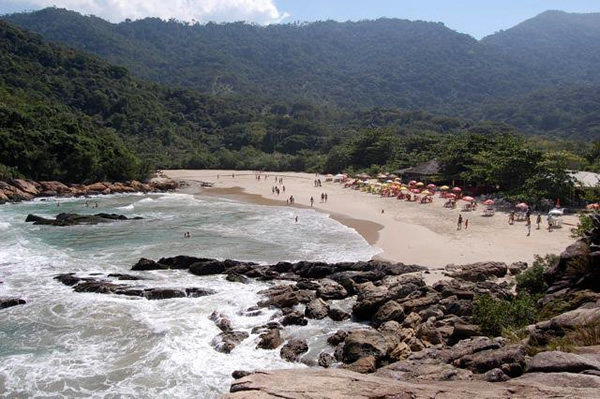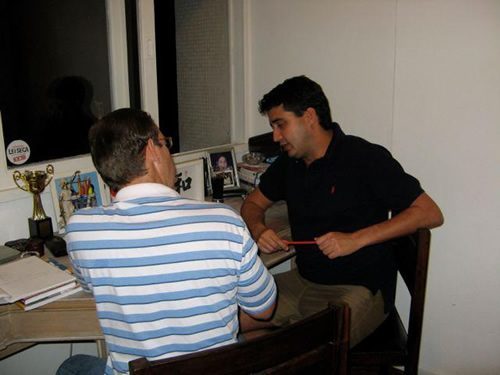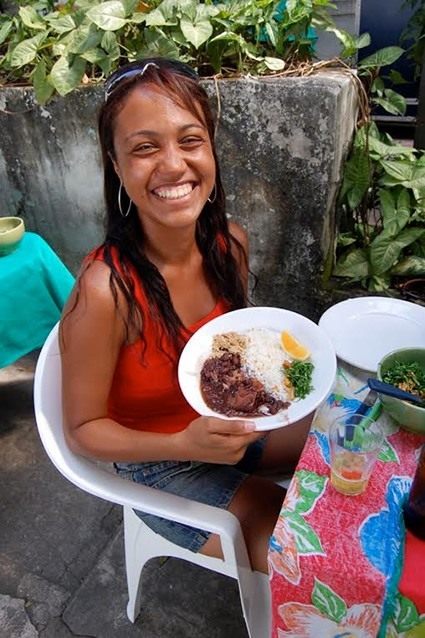Teaching English and Living in Brazil
The Demand is Great
Article and photos by John Clites
Resources updated 8/2/23 by Transitions Abroad

A beach in Paraty, Brazil.
Teaching
The demand for English teachers in Brazil remains high, which will only increase in the foreseeable future. The need underscores several factors: flourishing tourism, expanding international trade, and a burgeoning oil and gas industry. The enormous influx of visitors due to the World Cup and the Olympic Games resulted in many new job opportunities and an interest in Brazil to learn English. The largest markets by far for teachers exist in Sao Paulo and Rio de Janeiro, but a quick web search will reveal opportunities throughout the vast country.
Jobs fall predominantly into two categories: teaching for a private storefront school or teaching your students. Jobs with corporations and public or private high schools and universities are nearly impossible. Don't expect to land a full-time position with the benefits you might find back home, in the Middle East or the Orient. However, work abounds here, whether you have a certificate and experience or not, so if you have a knight-errant attitude, Brazil is the place for you.
Note that Brazil is no longer cheap. The cost of living has increased significantly recently, particularly in Rio, which hosted the Olympics in 2016 and saw a resultant rent increase. You shouldn't expect to save a lot during your time here. However, optimize your income by teaching private students and securing reasonably priced accommodations. You'll be able to live a very comfortable middle-class life in a beautiful and inviting country and have significant free time to enjoy it. I've visited 27 countries and chose to make Brazil my home.
Private Schools
The easiest way to start teaching in Brazil is to train at a private language school. You can find private schools in every town of any size. Several franchises exist, including Wizard, Fisk, CCAA, CNA, Brasas, and Cultura Inglesa. Of these — and this is only my opinion — the first two are on the lower end of the quality of workplace scale, the middle two are decent, and the last two are the best places to work. You'll also find my assessments reflected in their respective pay scales.
There are also many independent language schools, particularly in larger towns and cities.
At either franchises or independents, you might teach in a classroom setting. You should expect to teach students of varying ages and abilities. Many schools, particularly the independents, also have private students seeking classes at home or the office.
It's easy to start with schools if you are a native speaker. You will likely have to take a standardized grammar test, but this should present little difficulty. No one will ask to see a work permit. (I'll discuss visas in-depth a bit later.)
Do note that most schools will start you on a trial basis, initially giving you only a few classes or one or two of their private students. So it's common to work for more than one school, and this practice is accepted.
Most schools, franchise or independent, offer some training — though the quality of that training varies. Expect franchises to have more formal programs. Independents tend to be small — the owner may be the office manager and teach classes, so teaching may amount to "ride along with me today." However, you should receive some training, access to materials, and — importantly — students who really want to learn English.
Pay Varies
Pay in Rio these days for private lessons is 75-100 reals per hour. In Sao Paulo, 90-125 reals or more is common depending upon experience (note that the conversion rate at the time of this writing is about 5 reals to US$1, but it is subject to change, so check before you arrive). However, the language school business is very competitive, and overhead limits what schools can pay. You can always negotiate. I would ask for travel expenses to significantly enhance your effective earnings.
Experienced teachers can always try to negotiate for greater pay.
In smaller towns, you might earn only 20 reals per hour, but then it's all relative to the cost of your style of living. I'll address the cost of living choices a bit later.
Spanish classes are also popular here. If you speak Spanish in addition to English, you'll find yourself in a stronger bargaining position.
This may be the place to note that your dress and how you present yourself are essential here — more so than in much of the U.S. You will be judged on appearance, so bear that in mind. While clean jeans are typical in business settings, and it's OK to wear them to classes sometimes, I wouldn't show up to an interview in them. There are lots of surfer types in Rio and other coastal towns just wanting to teach enough to support their hobby; present yourself in a professional light, and you'll stand out.

John teaching Hugo.
Private Students
My recommendation for most prospective teachers is to start with schools and build your base of private students. The first reason should be obvious: Without the school in the middle, the students can pay a bit less, and you still earn much more — often twice per hour what the schools can pay you. Other benefits include the freedom to accept or reject students, more control over your schedule, and (if you follow my strong recommendation) payment in advance rather than after the delivery of classes.
If you want to build up a base of private students and plan to stay put for any time, invest in some business cards. They are cheap here. An average price might be 75 reals for 1000 cards. If you have special skills or knowledge, highlight them on your card. I have an MBA. I put this on my cards and indicate that I specialize in business English. These cards work. I have often received calls from prospective students who obtained my card second or third-hand. So have some nice cards printed, and pass them out freely, even if the person you are talking to doesn't appear to be a likely candidate.
Once you have a few students, ask for referrals. Word of mouth is the favored means of securing business the world over, but in Brazil, a recommendation is far and away the best way to ensure work. After a year in Rio, all I had to do if I wanted new students was to spread the word among my existing students. The following week, my cell would start ringing. Brazilians are very social people and like to be helpful. Leverage those traits.
I only teach private students, and I much prefer this arrangement, but there are drawbacks. First, expect some cancellations, often on short notice. This problem is easy to resolve: Require payment in advance, and stipulate that payment is forfeited if the student cancels the day of the scheduled class. Having simple, printed policies to hand to prospects makes explaining your guidelines easier and lends them more weight.
The other drawback to teaching private students is that most want classes early in the day (7:00-10:00), at lunchtime, or in the evenings. But this may work out for you. In the late morning, I run errands, and most afternoons, I go to the gym. The hours aren't necessarily a drawback if you are flexible, as most freelancers are accustomed.
General Note Regarding Brazilian Students
One of the best things about teaching English in Brazil is the students. Brazilians as a group are warm and friendly and given to laughter. You'll find that your students sincerely want to learn English and will respect you. My mother was an English professor in the U.S. her entire adult life, and in her last several years working, she lamented the decline in students: their knowledge, attire, general attitude, and lack of respect.
Brazilian students, by contrast, are eager to learn. They can't always find time to do their homework, but they are polite, enthusiastic, and appreciative. It feels terrific to hear a student say, "Thank you, teacher," at the end of class.
Brazilian students, by contrast, are eager to learn. OK, they can’t always find time to do their homework, but they are polite, eager, and appreciative. It feels really good to hear a student say, “Thank you, teacher” at the end of class.
But it's more than just manners. My students have helped me tremendously. Beyond providing referrals, they helped me get provisional residency here and permanent residency. I've been invited to dinners in homes, birthday parties, and even weddings. Brazilians are curious and often disarmingly direct. Your students will want to know all about you if you are approachable. They will usually advise you and want to look after you. It's sweet.
I'll be honest and say that I didn't come to Brazil to be an English teacher. Teaching was a fast and sure way to start making some money here. But I found that I really enjoyed it — in large part because the students here are so wonderful.
Other Types of Work
While teaching private students or for a storefront school are far and away the most common ways here to make a living with English, there are others. And you may want to investigate some others because you'll find — again, especially in Rio — that your class hours will fall dramatically from December through February. Summer vacations fall during this period, not to mention Christmas, New Year's, and Carnival. Brazilians joke that the New Year here starts in March.
So what do you do? Well, this could be a good time for you to travel yourself, either back home or around this beautiful country.
There are also other ways to make money. Besides teaching classes, I have:
-
Prepared students for the TOEFL exam
-
Prepared students for interviews in English
-
Interviewed candidates in English for corporate clients
-
Edited articles and papers already in rough English
-
Assisted students and professionals in applying for study programs
You could also do something completed unrelated. A woman I know with a background in the business does some small-scale import/export to augment her teaching income in the slow months.
Visas
Getting a work visa is only possible if you have a specialty such as medicine or engineering. Few English teachers get them. Most foreigners teaching English in Brazil do so on tourist visas, which are good for 180 days per year. Technically, the government does not condone teaching on a tourist visa, but I have never heard of anyone being ejected for teaching without a work visa.
So what if you overstay your tourist visa? Let's say you arrive March 1st (which is an excellent time to come, just after Carnival, when things get serious). You can stay 180 days on your tourist visa until the very end of August. But you choose to get going until December 15th before going back home. Then, you will have to pay a fine for overstaying, 8.26 reals (updated) for every day you overstay, but it's capped at 100 days or 826 reals. So the max that you would pay, regardless of how long you overstayed, would be less than US$400. And in this scenario, you could return again the next March 1st. Pay the fine, and all is forgiven.

Iguaçu Falls in Brazil.
Living in Brazil
Housing
Housing is rarely included in any teaching offer here, except for a few volunteer or earn-your-TEFL-while-you-teach programs. Housing will be your primary expense, so give some thought to it, and if possible, do some research before you even leave home.
Renting your place may be too expensive, and the red tape can also be daunting, although it's easier in smaller towns, especially if you can deal directly with the owner. There are other options.
Aparthotels, which cater primarily to business people on extended assignments away from home, can be found in Rio and Sao Paulo. While they aren't typically cheap, you won't have to sign a long-term contract, and credit cards are usually accepted. Most I've seen have two bedrooms, so if you have or can find a roommate, this is an option to consider.
Many people rent a room or a suite (bedroom with its own bath) in someone else's house or apartment. This can be a great arrangement if you find folks you are comfortable with. See the box at the end of this article for websites.
If you've lined up a job before leaving home, or at least arranged an interview with a school, you could ask them for suggestions. I know of one woman who was matched with another teacher in this way.
TEFL.com provides average living expenses for many cities, and you can also search the online version of local newspapers for rental costs. At this time in Rio, you should expect to pay 1000-1500 reals per month for a room in Zona Sul — the better section of the city, which includes Ipanema and Copacabana. But this is doable if you make 4000-5000 reals and have no car.
Food

Enjoying a feijoada.
To my taster, Brazilian food tends to be basic and a bit bland but also fresh, cheap, and healthy if you prefer a diet high in fruit and vegetables. While it's easy to succumb to overeating rice and beans and fried pastries, you'll also find a wealth of healthy foods available. Fruits exist here that I never saw back in the States. There is a juice bar on every corner. Farmers' markets can be found in many towns, large and small. In Rio, I could buy enough vegetables at the weekly market to last all week for no more than 14-15 reals.
Por kilo (by-the-kilo) restaurants are a Brazilian institution. The quality of these restaurants varies, but the better ones have a wide selection of foods, including great salads, for reasonable prices. You could pay 10-25 reals per meal depending on the restaurant and your appetite.
When you are on the go, you can always grab a pastel (pastry). They are ubiquitous here and come in many varieties, most selling for 2.50 reals.
Transportation
Rio and Sao Paulo both have good metro systems. I suggest finding a place to live close to a station, as you'll likely be traveling around to your students' homes or places of business.
Buses in Brazil are cheap and will get you to almost any place you might need to go, although the bus drivers tend to drive as if they are on the NASCAR circuit. Look at it as an adventure.
See the box at the end of this article for useful links.
Health Care
Brazil has free public health care, and foreigners will be treated. (I've used it myself when bitten by a stray dog.) But lines can be long, and the quality of care is hit or miss depending upon your locale. You'll likely work in a larger city with longer lines. So you may obtain private health care — also available to foreigners.
In Rio, I paid 280 reals per month for a medical plan. In the small town where I now live, I pay 400, due mainly to lack of competition. These plans are middle of the road but protect me in an emergency. As a side note, I've been pleased with my treatment here.
Off-the-Clock Activities

View of Ponto do Criminoso.
If you've chosen to teach English abroad, you have an adventurous soul. There's also a good chance then that you'd love Brazil.
Indeed, you've likely seen footage of Carnival many times on T.V., but Brazilian culture encompasses so much more. From Oktoberfest in Blumenau to the Festival Literaria Internacional de Paraty (FLIP) here in my little town (Paraty), Brazil presents an amazing wealth of things to do, many free or inexpensive.
Some of the simplest activities are my favorites: meeting my friends at the usual bar or barraca (shack) on the beach. Walking along the beach. Striking a conversation with the person who invited you to share his table on the crowded sidewalk.
For the active, there is surfing, hang gliding, parasailing, mountaineering, kayaking — the list goes on and on. And Brazil is a photographer's dream.

Hang gliding is an excellent activity in Brazil.
Many ESL teachers choose to work only Monday-Thursday. Most private students will have classes either Monday/Wednesday or Tuesday/Thursday, leaving you free to spend Friday morning getting organized before heading out to begin the weekend seeking adventure or simply relaxing.
There is plenty of work for you here in Brazil, and — certainly in the larger locales — there are plenty of activities to keep you entertained. The perpetual challenge is to balance the two!
|
For More Information
The following site lists countries in Brazil that do NOT require a visa: PassportVisasExpress.com.
Note that this is not an official Brazilian government site but a site for visa services. Better yet, find your closest Brazilian embassy for the latest information.
You can also check out selected expatriate websites for Brazil here on Transitions Abroad for more information on organizations that bring together locals and expats or provide the information expats need, including where to find temporary and permanent accommodations. In addition to much practical knowledge, you can make friends and network on expatriate websites.
Note from the author: "Many schools these days are now asking for a work visa. I would suggest trying smaller, independent language schools, which often are happy to find native speakers. Also, I would encourage teachers to look for their own private students, with no school as a middleman. I've never been asked by a private student if I had a work visa. Additionally, the teacher makes much more without the school as a middleman. Business cards and strategically placed flyers (at universities, multinational businesses, etc.) also will bring initial students. Then, ask for referrals! That's the single best way to land new students. Private students never ask."
|
John
Clites is a U.S. citizen who caught the travel bug as a small child. He has visited 30+ countries, with more to come. John moved to Brazil in 2008, where he teaches English and writes freelance.
John started teaching online in 2012, and now teaches exclusively online, as it provides him great freedom to pick up and go anywhere when the urge overtakes him.
For readers who are interested in following in John's footsteps, he has created a comprehensive online course, “Teaching English in Brazil.”
|
